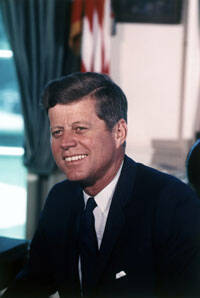The Finger of Suspicion
“I just don’t believe that people in this country are going to choose their candidate based on which church he or she goes to,” former Massachusetts Governor Mitt Romney said in a recent Republican primary debate in Florida. The problem for Mr. Romney’s presidential hopes is that at least some voters have already voted against him using precisely that criterion, according to polling data. And a recent NBC News/Wall Street Journal poll indicated that 44 percent of Americans believe that a Mormon president would have a difficult time uniting the country.
We have seen this before. This magazine, for much of its history, railed against similar bigotry directed against Catholic politicians. Its name, America, was chosen in part to evoke a seminal ideal at the heart of the American founding: no religious test is permitted or ought to be expected of any candidate for public office.
Forty-eight years ago, then-Senator John F. Kennedy, responding to Americans’ unease with his candidacy, said: “While this year it may be a Catholic against whom the finger of suspicion is pointed, in other years it has been, and may someday be again, a Jew—or a Quaker—or a Unitarian—or a Baptist.… Today I may be the victim—but tomorrow it may be you.”
This year the finger of suspicion is pointed at a Mormon. There may be good reasons not to vote for Mr. Romney, but his faith is not one of them. The anti-Mormon whispers and, in some quarters, the outright bigotry directed against him are unfair, un-American and un-Christian.
New Wineskins
The news coming from Rome during the Jesuits’ 35th General Congregation includes startling information on how dramatically the Society of Jesus has changed in recent decades. Once dominated by Europeans and Americans, the Jesuits now have more members of Indian background than any other grouping. As the order continues to shrink in Europe and America, the Indian Assistancy, with more than 4,000 Jesuits, is becoming increasingly prominent in the Society’s governance and apostolic priorities. The days of the West sending missionaries to the East are over, replaced by a phenomenon already visible in many parishes—South Asian priests and religious coming to the West.
How will this affect Jesuit apostolic work in the United States? In their own country, Indian Jesuits are part of a tiny religious minority (Christians make up less than 3 percent of the population in India) and are accustomed to a cultural context requiring far more interreligious dialogue than their American brothers. Many will have lived and studied at Western educational institutions, so they will have some familiarity with U.S. religious culture (far more than American Jesuits will have with theirs). They will also be less tied to the Irish-American hierarchies that have dominated the ranks of American priests and religious. They will also face serious challenges, because foreign priests are often not privy to our own national internecine struggles and concerns, particularly around hot-button issues like the role of women and the laity in the contemporary church. American Jesuits will have much to learn from their Indian brothers, but also much to offer them about the American cultural experience of Catholicism.
Big Pharma and the Poor
The pharmaceutical industry is failing to make key medications available to millions of people in developing countries, according to a recent report from Oxfam International, Investing for Life. The study examined the practices of the world’s 12 biggest pharmaceutical companies—practices that include putting protection of intellectual property rights ahead of the critical health needs of people in the world’s poorest countries. The companies mount fierce resistance to cheaper generic drugs, which they see as unacceptable competition. And yet generic competition, the report observes, “is the most effective...method to reduce drug prices.”
Oxfam’s executive director has said the industry should recognize that smothering generic competition and fighting for stricter patent laws amount to a “moral outrage.” Currently, over 85 percent of world consumers are either underserved or have no access at all to essential medications the companies produce. Poor people therefore continue to face diseases like malaria, tuberculosis, cancer and H.I.V./AIDS without affordable medicines. The report also faults the industry for neglecting research and development into diseases that disproportionately affect people in developing countries. Between 1999 and 2004, it says, there were only three new drugs targeted at diseases affecting the developing world, out of 163 brought to the market. The author of the Oxfam report, Helena Vines-Fiestas, points out that even for people suffering from tuberculosis—which kills nearly two million people a year—the most recent medicine is 30 years old. The report’s executive summary calls for the pharmaceutical companies to incorporate “a social equity bottom line into their thinking” when it comes to pricing. That bottom line has yet to be put in place.








